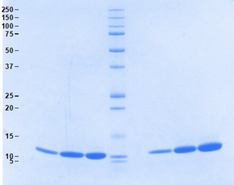
Apolipoprotein CII
Product Sizes
0.05 mg
16-16-120302-0.05MG
0.1 mg
16-16-120302-0.1MG
1 mg
16-16-120302-1MG
About this Product
- SKU:
- 16-16-120302
- Additional Names:
- ApoCII|In Vitro Diagnostics, Cardiovascular Research
- Buffer:
- Lyophilized from 10 mM NH4HCO3, pH 7.4
- CE/IVD:
- RUO
- Extra Details:
- Apolipoprotein CII (ApoCII) is a 79-amino acid protein encoded by the APOC2 gene, serving as an essential cofactor for lipoprotein lipase (LPL) activation. This protein circulates in plasma as a component of triglyceride-rich lipoproteins (TRLs), including very low-density lipoproteins (VLDL) and chylomicrons, with normal concentrations ranging from 3-8 mg per 100 mL. ApoCII binds to LPL via its C-terminal A Alpha-helix (residues 58-79), stabilizing the enzyme's catalytic domain and facilitating the hydrolysis of VLDL triglycerides into free fatty acids and glycerol, a process critical for generating intermediate-density lipoproteins (IDL). This lipolytic activity enables cellular energy uptake and regulates plasma lipid homeostasis. Deficiency in ApoCII, caused by biallelic APOC2 mutations, results in familial hyperlipoproteinemia type IB, characterized by severe hypertriglyceridemia (>1,000 mg/dL), recurrent pancreatitis, and eruptive xanthomas. The absence of functional ApoCII impairs LPL-mediated triglyceride clearance, leading to chylomicronemia and atherosclerosis in preclinical models. Heterozygotes typically remain asymptomatic due to ApoCII's excess physiological presence. Clinically, ApoCII deficiency is diagnosed through genetic testing and plasma apolipoprotein profiling, with acute pancreatitis managed via fresh frozen plasma infusions to replenish ApoCII. Emerging therapeutic strategies include synthetic ApoCII mimetic peptides, such as C-II-a, which combine lipid-binding and LPL-activating domains to restore triglyceride metabolism. While gene therapies like alipogene tiparvovec showed promise in preclinical studies, their clinical adoption remains limited. Additionally, ApoCII's role in modulating lipoprotein particle interactions positions it as a biomarker for cardiovascular risk assessment and a target for lipid-lowering interventions.
- Formulation:
- Lyophilized from 10 mM NH4HCO3, pH 7.4
- Molecular Weight:
- 8,800 Da
- Physical State:
- Lyophilized
- Purity:
- ≥95%
- Purification:
- Liquid Chromatography Methods
- Shipping Conditions:
- Blue Ice
- Source:
- Prepared from fresh, non-frozen plasma shown to be non reactive for HBsAg, anti-HCV, anti-HBc, and negative for anti-HIV 1 & 2 by FDA approved tests.
- Storage Conditions:
- Please refer to datasheet
- Supplier:
- Athens Bioscience, Inc.
- Type:
- Proteins, Peptides, Small Molecules & Other Biomolecules: Native


